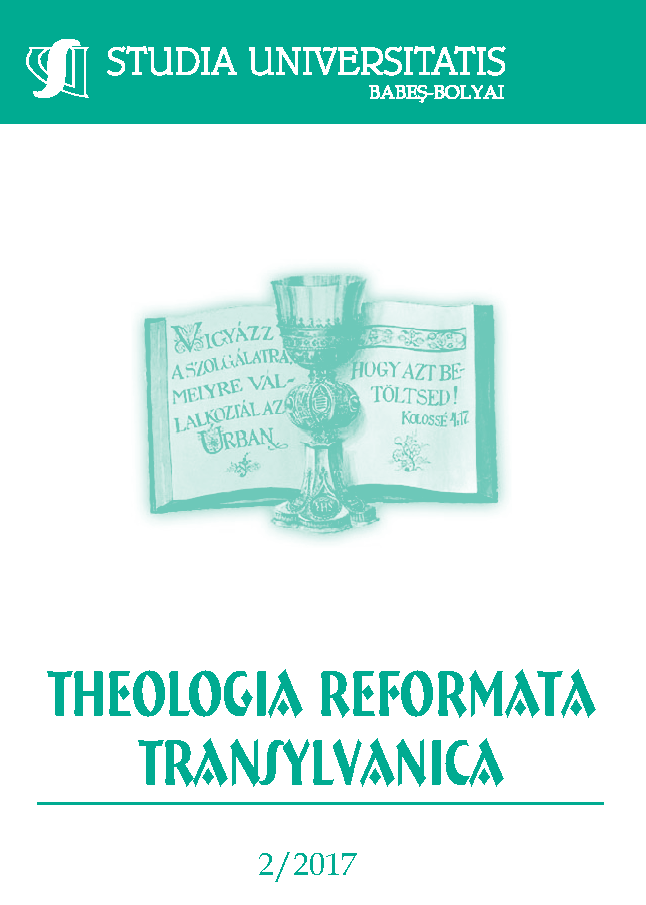Zwinglian–Calvinist Debate on Church Discipline in the Pays de Vaud
DOI:
https://doi.org/10.24193/subbtref.62.2.07Keywords:
Calvin, Calvinism, Zwinglianism, Pays de Vaud, Berne, Reformation debate, Wolfgang Musculus, Pierre Viret, church discipline, excommunication, church–state relations.Abstract
The article discusses a theological debate on church discipline between Calvinist pastors living in the French speaking territory of Pays de Vaud and the Zwinglian City-state of Berne from the mid-1530s to 1560. From 1536 Pays de Vaud belonged to the Bernese protestant administration but consisted primarily of French refugee pastors allegiant to Calvin and his ideas. They Calvinists of Pays de Vaud questioned the civil magistrate’s right to interfere into church affairs especially into the practice of church discipline, such as exclusion from the Lord’s Supper and ex-communication from the congregation. According to the Zwinglian establishment of Berne the right for exclusion and excommunication belonged to the civil magistrates. In the Calvinists’ view the appropriate administrator of the exclusion and ex-communication was the Genevian-type consistory, consisting of both clerical and civilian elected members. Noteworthy significance can be attributed to the events in the Pays de Vaud. On the one hand, banished from Bernese territory most of the Calvinist pastors of Vaud were sent to reinforce the French underground evangelical movement. The Calvinists’ failure in the Pays de Vaud turned Calvin’s attention to France by which the Calvinism became a world phenomenon. On the other hand, from this struggle emerged a theological justification for the state’s supremacy over church affairs, namely by Wolfgang Musculus’ De Magistratibus. Interestingly, this justification played a more important role in later times than in the actual controversy: Thomas Erastus, the builder of the territorial state–church of the Palatinate, John Withgift, the archbishop of Canterbury and the protector of Tudor-Absolutism against the Puritans, and the Dutch Remonstrants all were influenced by the teaching of Musculus. The goal of this paper is to present how the two controversial sides regulated its church affairs and, in addition, to show the highpoint of the debate between Calvin’s Vaudois adherers and the Bernese Magistrate for the government of the church, especially for the right of excommunication.References
Berner Synodus in Synodalrat der Evangelisch-reformierten Kirche des Kantons Bern: Dokumente der Berner Reformation Berner Synodus mit den Schlussreden der Berner Disputation und dem Reformationsmandat, Paul Haupt, Bern, 1978.
BILDHEIM, Stefan: Calvinistische Staatstheorien, Peter Lang, Frankfurt am Main, 2001.
BONNET, Jules (ed.): Letters of John Calvin, Vol. 3., Burt Franklin, New York, 1858.
BUCER, Martin: Dialogi oder Gesprech von der Gemeinsame und den Kirchenübungen der Schriften, und was yeder Oberkait von ampts wegen auss Göttlichem befelch an denselbigen zu versehen un zu besseren gebüre, in: Robert STUPPERICH (ed.): Martin Bucers Deutsche Schriften, Güttersloh, 1960.
BUNDESHAGEN, Bernard: Die Konflikte des Zwinglianismus, Luthertums und Calvinis-mus in der Bernischen Landeskirche von 1532–1558, Bern, 1842.
CADIER, Jean: Kálvin, Református Zsinat Sajtóosztálya, Budapest, 1980.
CALVIN, John: Ecclesiastical Ordinances, in: J. K. S. REID (ed.): Theological treatises, Westminster Press, Philadelphia, 1954.
CALVIN, John: Institutes of the Christian Religion, Eerdmans, Grand Rapids, 1970.
DELLSPERGER, Rudolf (ed.): Wolfgang Musculus (1497–1563) und die oberdeutsche Reformation, Akademie Verlag, Berlin, 1997.
FAJTH Tibor: Svájc, Panoráma, Budapest, 1980.
GORDON, Bruce: The Swiss Reformation, Manchester University Press, Manchester, 2002. 159.
FORD, James Thomas: Wolfgang Musculus on the Office of the Christian Magistrate, Güttersloher Verlag, Güttersloh, 2000.
GUGGISBERG, Kurt: Bernische Kirchengeschichte, Paul Haupt, Bern, 1958.
GUGGISBERG, Kurt: Calvin und Bern, in: Martin HAAS – René HAUSWIRTH (eds.): Festgabe von Leonhard von Muralt, Berichthaus, Zürich, 1970.
HEUSSI, Karl: Az egyháztörténet kézikönyve, Osiris, Budapest, 2000.
KÖHLER, Walther: Zürcher Ehegericht und Genfer Konsistorium, M. Heinsius, Leipzig, 1932.
KRESSNER, Helmut: Schweizer Ursprünge des anglikanischen Staatskirchentums, C. Bertelsmann, Güttersloh: 1953.
LAVATER, Hans Rudolf: Zwingli und Bern – 450 Jahre Berner Reformation Beiträge zur Geschichte der Berner Reformation und zu Niklaus Manuel, Historisches Verein des Kantons Bern, Bern, 1980.
LINDER, Robert Dean: The Political Ideas of Pierre Viret, Droz, Geneva, 1964.
MCGRATH, Alister E.: A Life of John Calvin, Blackwell, Oxford, 1990.
MUSCULUS, Wolfgang: Common places of Christian religion, gathered by Wolfgangus Musculus, for the vse of such as desire the knovvledge of godly truth. Translated out of Latine into English, by Iohn Man of Merton Colledge in Oxforde. Herevnto are added tvvo other treatises, made by the same author, one of othes, and an other of usury. VVith a most perfect and plentifull table. Seene and allovved according to the order appoynted in the Queenes Maiesties iniunctions, Henry Bynneman, London, 1578.
NAPHY, William G.: Calvin and the Consolidation of the Genevian Reformation, WJK, Louisville, 2003.
PFISTER, Rudolf: Pierre Viret, 1511–1571, in: Zwingliana, 11., 1961. 321–345.
SCHWAB, Paul Josiah: The Attitude of Wolfgang Musculus towards Religious Tolerance, Mennonite Press, Scottdale, 1933.
STECK, R.– G. TOBLER: Aktensammlung zur Geschichte der Berner-Reformation, K. J. Wyss Erben, Berne, 1923.
SÜTŐ András: Csillag a máglyán [Star on the Stake], Bucuresti, 1975.
WIJNKOOP LÜTHI, Marc van: Reformator, Europäer, Flüchtling – Wolfgang Musculus – eine Entdeckung und eine Ausstellung in der Münsterkapelle Bern, in: Der kleine Bund 219 (20 September 1997)
WIJNKOOP LÜTHI, Marc van: Wolfgang Musculus und die römische Kirche, in: Marc van WIJNKOOP LÜTHI (ed.): Musculiana, Zur Paraburi, Thun, 1999.
WITTE, John Jr. – Robert M. KINGDON: Sex, Marriage, and Family in John Calvin’s Geneva – Courtship, Engagement, and Marriage, Eerdmans, Grand Rapids, 2005.
ZWINGLI, Ulrich: Divine and Human Righteousness, in: H.W. PIPKIN – E.J. FURCHA (eds.): Huldrych Zwingli’s Writings, Allison Park, 1984.
ZWINGLI, Ulrich: Auslegen und Gründe der Schlussreden, in: Emil EGLI (ed.): Huldreich Zwinglis Sämtliche
Downloads
Published
How to Cite
Issue
Section
License
Copyright (c) 2017 Studia Universitatis Babeș-Bolyai Theologia Reformata Transylvanica

This work is licensed under a Creative Commons Attribution-NonCommercial-NoDerivatives 4.0 International License.






